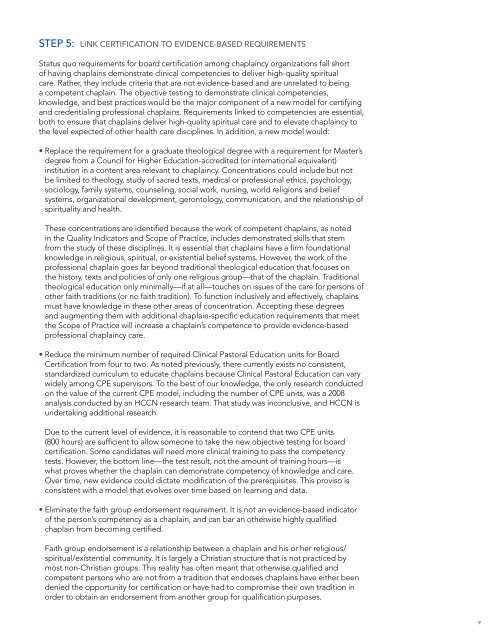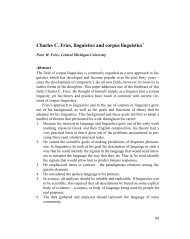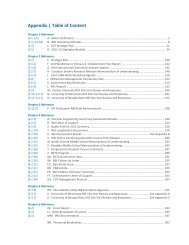TIME TO MOVE FORWARD
time_to_move_forward_report_2016-06-07
time_to_move_forward_report_2016-06-07
You also want an ePaper? Increase the reach of your titles
YUMPU automatically turns print PDFs into web optimized ePapers that Google loves.
STEP 5: LINK CERTIFICATION <strong>TO</strong> EVIDENCE-BASED REQUIREMENTS<br />
Status quo requirements for board certification among chaplaincy organizations fall short<br />
of having chaplains demonstrate clinical competencies to deliver high-quality spiritual<br />
care. Rather, they include criteria that are not evidence-based and are unrelated to being<br />
a competent chaplain. The objective testing to demonstrate clinical competencies,<br />
knowledge, and best practices would be the major component of a new model for certifying<br />
and credentialing professional chaplains. Requirements linked to competencies are essential,<br />
both to ensure that chaplains deliver high-quality spiritual care and to elevate chaplaincy to<br />
the level expected of other health care disciplines. In addition, a new model would:<br />
• Replace the requirement for a graduate theological degree with a requirement for Master’s<br />
degree from a Council for Higher Education-accredited (or international equivalent)<br />
institution in a content area relevant to chaplaincy. Concentrations could include but not<br />
be limited to theology, study of sacred texts, medical or professional ethics, psychology,<br />
sociology, family systems, counseling, social work, nursing, world religions and belief<br />
systems, organizational development, gerontology, communication, and the relationship of<br />
spirituality and health.<br />
These concentrations are identified because the work of competent chaplains, as noted<br />
in the Quality Indicators and Scope of Practice, includes demonstrated skills that stem<br />
from the study of these disciplines. It is essential that chaplains have a firm foundational<br />
knowledge in religious, spiritual, or existential belief systems. However, the work of the<br />
professional chaplain goes far beyond traditional theological education that focuses on<br />
the history, texts and policies of only one religious group—that of the chaplain. Traditional<br />
theological education only minimally—if at all—touches on issues of the care for persons of<br />
other faith traditions (or no faith tradition). To function inclusively and effectively, chaplains<br />
must have knowledge in these other areas of concentration. Accepting these degrees<br />
and augmenting them with additional chaplain-specific education requirements that meet<br />
the Scope of Practice will increase a chaplain’s competence to provide evidence-based<br />
professional chaplaincy care.<br />
• Reduce the minimum number of required Clinical Pastoral Education units for Board<br />
Certification from four to two. As noted previously, there currently exists no consistent,<br />
standardized curriculum to educate chaplains because Clinical Pastoral Education can vary<br />
widely among CPE supervisors. To the best of our knowledge, the only research conducted<br />
on the value of the current CPE model, including the number of CPE units, was a 2008<br />
analysis conducted by an HCCN research team. That study was inconclusive, and HCCN is<br />
undertaking additional research.<br />
Due to the current level of evidence, it is reasonable to contend that two CPE units<br />
(800 hours) are sufficient to allow someone to take the new objective testing for board<br />
certification. Some candidates will need more clinical training to pass the competency<br />
tests. However, the bottom line—the test result, not the amount of training hours—is<br />
what proves whether the chaplain can demonstrate competency of knowledge and care.<br />
Over time, new evidence could dictate modification of the prerequisites. This proviso is<br />
consistent with a model that evolves over time based on learning and data.<br />
• Eliminate the faith group endorsement requirement. It is not an evidence-based indicator<br />
of the person’s competency as a chaplain, and can bar an otherwise highly qualified<br />
chaplain from becoming certified.<br />
Faith group endorsement is a relationship between a chaplain and his or her religious/<br />
spiritual/existential community. It is largely a Christian structure that is not practiced by<br />
most non-Christian groups. This reality has often meant that otherwise qualified and<br />
competent persons who are not from a tradition that endorses chaplains have either been<br />
denied the opportunity for certification or have had to compromise their own tradition in<br />
order to obtain an endorsement from another group for qualification purposes.<br />
9








